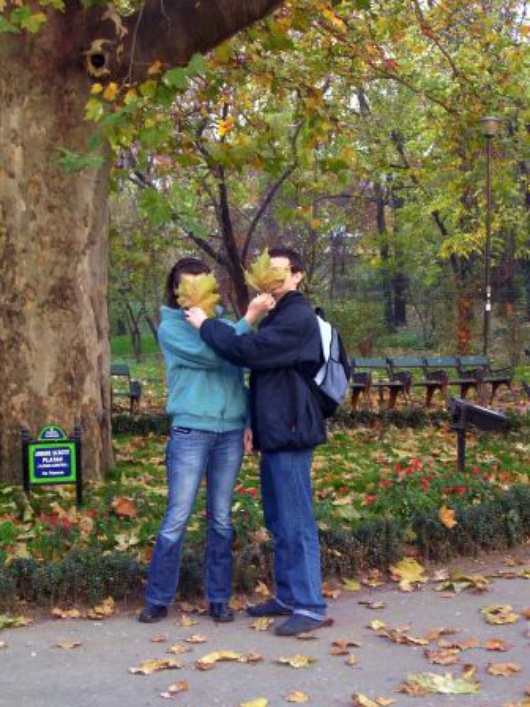Love scanarios
Published on
Love – an inexhaustible subject, tackled from any point of view, by all sort of characters that can’t be written down on the list of taboos anymore because the media today knew how to seize it in order to develop attractive, manipulative, novelty stories.
 The media, the art, the movies made of love’s two representative words – “I love you” a nonconformist greeting, a fashion that, through revision, perseverant presence on screen and in literature, the population appropriates it. In this rhythm, love is simply devaluated. And you start watching dum-dum all the new scenarios: women divide themselves between the desire for true love and their career, they have become more pretentious, and they want to enjoy their freedom, with the growing tendency to run away from love and marriage. Meanwhile, men tend to keep up with them, not wanting to forget their role of master and ruler they used to have.
The media, the art, the movies made of love’s two representative words – “I love you” a nonconformist greeting, a fashion that, through revision, perseverant presence on screen and in literature, the population appropriates it. In this rhythm, love is simply devaluated. And you start watching dum-dum all the new scenarios: women divide themselves between the desire for true love and their career, they have become more pretentious, and they want to enjoy their freedom, with the growing tendency to run away from love and marriage. Meanwhile, men tend to keep up with them, not wanting to forget their role of master and ruler they used to have.
Although they seem comical, these two scenarios both converge to a sort of human publicity, in which the two genders become products, on an opened market. The more you know how to promote yourself, the more the chances you get to be chosen from all the other offers. And the funny thing is that there are n “recipe” books on how to become more lovable, or the best way to love or been loved. And the true is love is meant to be lived in that very instant, not thought trough.
The paradox is that the earlier mentioned scenarios raise another consequence: idealization. Literature is studded with love quotes, novels and poetries that make the lover’s world different from the real one, deformed by dreams he tends to have about the perfect person and the perfect love. Seen through the eyes of a lover, love has no limits: it’s exaggerated, it demands, it obsesses, it fascinates, it bothers and it tires. And deviating him from reality, great dreams of love, great expectations lead to great disappointments.
 Two well known sociologists, Hatfield and Walster (1981) talk about tree conditions why people do fall in love: you have to believe that real love does exist and could happen to you; you design and materialise the qualities of your ideal lover and last, but not least, the existence of emotional, physiological and behavioural acts, like body language, exuberance, butterflies in your stomach etc.
Two well known sociologists, Hatfield and Walster (1981) talk about tree conditions why people do fall in love: you have to believe that real love does exist and could happen to you; you design and materialise the qualities of your ideal lover and last, but not least, the existence of emotional, physiological and behavioural acts, like body language, exuberance, butterflies in your stomach etc.
Let’s see: you have to believe that real love does exist and could happen to you. This kind of thinking occurs especially when mass media and literature are being sprinkled with love stories, with happy endings - but credible ones. Even experiences, the stories of real love told by grandparents, relatives, friends or even the ones you observe in your very own proximity can give you a role model, prepare and teach you to hope for such a love.
In this way, it leads to create a cognitive model of love – the idealization of love and of the person you consider mr/mrs Right. The ones who are risen in this kind of environment begin to strongly believe and be prepared for their own romance, being more probably that in the future, a nearer or a further one, to get to live this kind of emotional states. We tend to attract what we believe in that very moment.
Still, there are two not-wanted situations. Firstly, it could happen that the more you place your love closer to the top, the more you get pretentious with you love story and lover, the bigger the disappointment. Because you’ve raised love to the rank of perfection and you want to change everything in order to combine your criteria. Of course, you have concord love, but not your prejudices.
Secondly, there is the feeling at a common sense that love can change a person. Wrong! Love, with all its emotional alterations changes felt by the one in love – lack of concentration, absent-mindedness, babbling, insomnia or bad sleeping, lack of appetite, of energy, sensations of coldness / warmness – changes only temporary a person, only at the surface, his character remains the same. The violent person he was before fallen in love will be the same violent person after. A person, who likes to be bossy, will be bossy in his relationship also. A person with obsessive-compulsive disorder after falling in love will have the same disorder. Old habits die hard.
Today, each partner brings in his love life its own customs, tastes and abilities, which he has to adjust to the new situation he is submitted to. Men and women expect to negotiate a relationship that can satisfy the needs of each partner. In love, as in life, you have to be patient and endure some of the things. Nothing is perfect, but it can be close to perfection. The love scenarios proposed in media and books can be as real as the real-life inspired movies or documentaries. Let’s not forget that one of love’s ingredients is the will to love!



